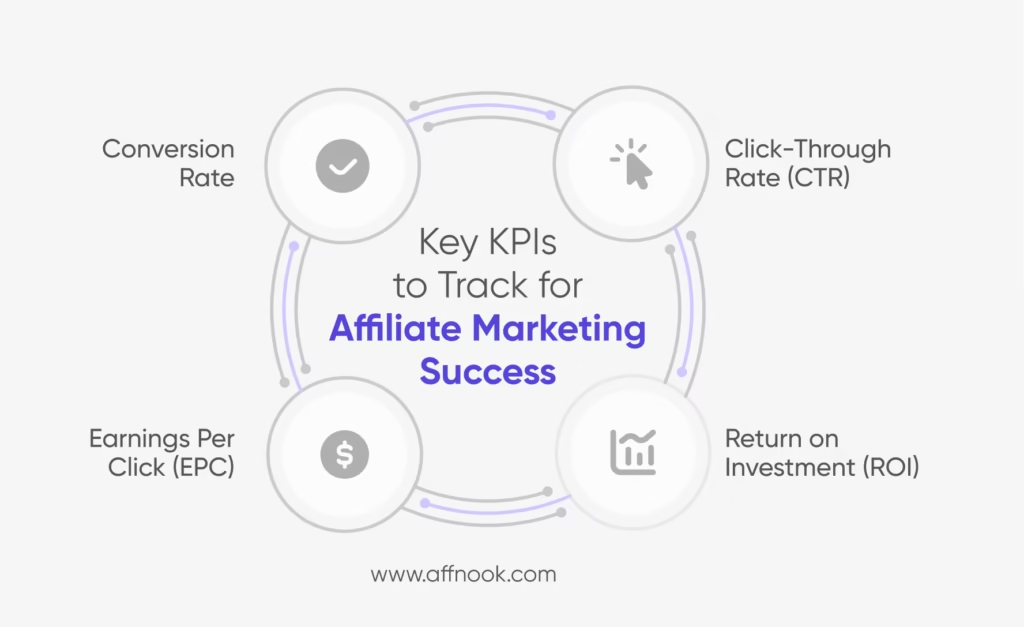Affiliate marketing is a rapidly changing industry, and as it keeps growing, effective measurement tools are required. Measuring the success of any affiliate marketing campaign revolves around understanding and making use of affiliate marketing KPIs (Key Performance Indicators).
These metrics offer premium insights into how your campaign is performing and help you make better decisions to modify your marketing strategy.
Affiliate marketing is not just a niche—it’s booming. In fact, U.S. businesses are projected to spend approximately $11.2 billion on affiliate marketing in 2025, underscoring the scale of the ecosystem and the need for robust KPIs.
Whether you are new to affiliate marketing or a seasoned marketer, understanding how to measure affiliate marketing success can make or break the game.
What are Affiliate Marketing KPIs?
When we talk about affiliate marketing, a KPI (Key Performance Indicator), is a measurable metric that assesses how well an affiliate marketing campaign is performing. KPIs are essential for monitoring the performance of iGaming affiliates and evaluating whether campaigns are meeting their desired objectives.
Generally, the affiliate manager or the business sets up these KPIs depending on the objectives of the affiliate program. It could be driving traffic, generating sales, boosting signups, or enhancing engagement.
Naturally, one KPI cannot apply to all business needs. They can be personalized to match specific business goals by aligning them with campaign needs, audience behavior, and the service/product nature.
For example, a brand with an objective to spread awareness might focus on clicks and impressions. On the other hand, a brand that wants conversions would prioritize conversion rates.
In affiliate marketing, clicks, conversions, sales, traffic, and general profitability can be measured using KPIs. By chasing the right KPIs, affiliate marketing publishers can evaluate their progress and make informed decisions to enhance their strategies and scale their business.
Why Do KPIs Matter in Affiliate Marketing?
Affiliate marketing KPIs are of utmost importance since they provide you with a brief of what’s working in your campaigns and what’s not. Without KPIs, it’s just shooting your chances in the dark. These metrics allow you to:
- Track Performance: KPIs offer a real-time summary of the performance of your affiliate campaigns. They help you assess which affiliates, strategies, or offers are generating the most revenue.
- Make Informed Decisions: KPIs help you optimize your strategies based on data and not assumptions, thus helping you boost ROI.
- Identify Trends: By measuring KPIs in the long run, you can easily spot patterns, like the most effective traffic sources, and modify your strategy accordingly.
- Optimize Campaigns: With the help of KPIs, you can refine your campaigns by paying attention to areas that require optimization, thus increasing your chances of success.
Key Affiliate Marketing Metrics to Track

Conversion Rate
This is one of the most crucial KPIs in affiliate marketing. It calculates the percentage of people who complete a desired action, like signing up or making a purchase, after they click on an affiliate link.
A higher conversion rate means that your traffic is highly interested and engaged with your offers like sign up bonuses, etc. A low conversion rate, on the other hand, indicates that your landing pages or offers require modifications.
Click-Through Rate (CTR)
CTR is the percentage of people who come across an affiliate link and click on it. This metric indicates how powerful and effective your calls to action are.
High CTR suggests that your content is compelling and relevant to your audience for them to take action. A low CTR indicates that your ad copy, design, or placement isn’t fruitful.
Earnings Per Click (EPC)
This is a metric that tells you the average revenue you’re earning for every click on an affiliate link. It’s a very effective metric to assess the profitability of an affiliate program.
A higher earnings per click metric simply means more revenue, which is important to scale your marketing efforts further.
Return on Investment (ROI)
ROI calculates the profitability of your affiliate marketing efforts by comparing the return received to the investment made. This is a critical KPI in affiliate marketing as you can get to know whether the money you’re spending on ads, content, and promotions, is generating enough revenue.
A positive ROI means you’re getting back more than you’re spending, which is the goal of affiliate marketing.
Tools to Measure Affiliate Marketing KPIs
To chase these significant KPIs, you need the right set of tools. Luckily, you’ve got Affnook to handle all affiliate marketing needs effortlessly.
It provides an easy-to-use dashboard for tracking important metrics like EPC, conversion rates, and ROI. Moreover, it comes with comprehensive reports on different campaigns and affiliates so that data-driven decisions can be made and revenue is maximized. But it doesn’t stop there.
On Affnook, you can personalize gross gaming revenue or net gaming revenue calculations to align with your business goals, ensuring accurate and relevant financial reporting. You can monitor multiple KPIs here simultaneously with the advanced ‘Saved Reports’ feature. This way, you can track progress across campaigns, affiliates, or time frames.
It also allows you to identify essential KPIs and pin them to the main dashboard for constant review. The KPIs can be monitored not just at the campaign-level but also customer-level, affiliate-level, click-level, and even individual activity-level. Affiliates can access the KPIs relevant to their own progress directly on the affiliate dashboard.
Best Practices for Measuring Affiliate Marketing KPIs
Measuring KPIs accurately is essential to receiving valuable insights. Here are the best practices:
- Set Clear Goals: Before calculating KPIs, you must have clear and specific goals, like increasing the conversion rate by 10%. This helps you in getting an idea of what success looks like to you, and ensures you can achieve it.
- Track Consistently: Ensure constant monitoring of your KPIs to spot trends and optimize when required.
- Use Multiple Metrics: A single KPI may not be able to offer a holistic overview. Make use of a combination of metrics (CTR, EPC, ROI, etc.) to get a detailed view of your performance.
- Adjust Based on Data: KPIs offer you actionable data to refine your strategies. So, if you identify low conversion rates, it’s your sign to modify your landing pages, traffic sources or offers for better outcomes.
Conclusion
Affiliate marketing KPIs form the foundation of any successful campaign. By understanding and calculating these metrics, you will easily enhance your efforts and generate greater revenue. Keep in mind that it’s not just about chasing numbers, it’s about making data-driven decisions that will lead to success in the long run.
Utilize Affnook to handle KPIs and modify strategies and make your affiliate marketing journey smoother. Begin tracking these KPIs today and watch your affiliate marketing revenue take off.
Help Section
1. What are the most important affiliate marketing KPIs for iGaming operators to track?
The most important KPIs include conversion rate, EPC (earnings per click), ROI, and player LTV, as they directly reflect affiliate performance and revenue impact.
2. How do I measure affiliate marketing ROI in online gambling campaigns?
To calculate ROI, subtract your affiliate spend from the revenue generated by referred players, then divide by the spend to assess profitability.
3. What is a good conversion rate in iGaming affiliate marketing?
A good iGaming affiliate conversion rate ranges between 3%–10%, but it varies by offer, region, and traffic quality.
4. Which tools help track affiliate marketing KPIs in real time?
Platforms like Affnook offer real-time dashboards and customizable KPI reports, ideal for tracking metrics like EPC, CTR, and revenue per affiliate.
5. Why is customer lifetime value (CLV) a key KPI in gambling affiliate marketing?
CLV shows how much revenue each referred player brings over time, helping brands identify high-value affiliates and optimize payout models accordingly.




